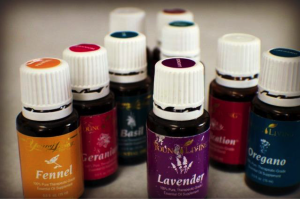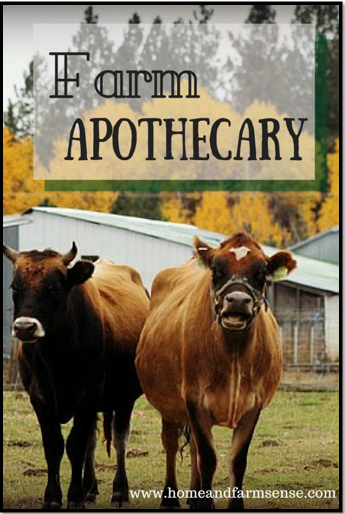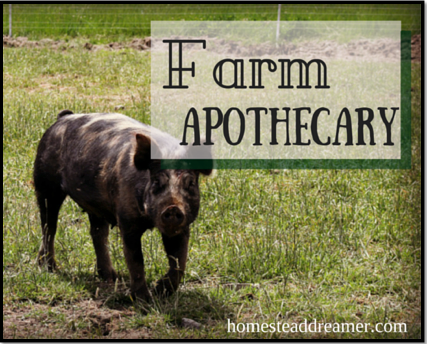 Guest Post by Home and Farm Sense
Guest Post by Home and Farm Sense
My family has been raising farm animals on our homestead for over 15 years . We started with chickens and goats and have progressed to pigs, sheep and cows as well.
One of my passions is treating people and livestock as naturally as possible. Although there have been a few instances where we called in a vet, for the most part we try to use the items we keep on hand in our ‘Farm Apothecary.’
Here are the tools we use to keep our animals healthy:
1. Essential Oils-
I fell in love with essential oils around this time last year. They are so amazingly effective and in such small doses. I either apply essential oils neat, dilute in a carrier oil, make a spray or salve. Here are some of the oils we use for various issues:
- Lavender – Stress or infection (we also use lavender in our homemade mastitis salve)
- Thyme, Basil or Oregano – ticks, infection and parasites (we successfully killed a huge tick on our dog’s head last year using Thyme oil)
- Geranium – bleeding ( we had pig that got pretty cut up – I made a spray of carrier oil, Geranium essential oil and water, sprayed it on the area and the wound stopped bleeding within a few minutes)
- Pan Away and Aroma Siez (these are blends by Young Living) – limping, bone issues
- Tea tree – also in our mastitis salve and great for infections
- Thieves – infection, respiratory illness
- Peppermint/Fennel/Di-Gize – bloat or for animals who will not eat
- Peace and Calming – birthing, calming during castration or dehorning
- Helichrysum– wound healing
2. Diatomaceous Earth –
We mainly use DE during the warmer months when worms are more active. Its an effective worm and parasite killer and easy to use. We mix it with our animal’s supplements (more on that in a bit). Its important to put it out on a non rainy day though as water can cause it to be ineffective. I buy DE by the 50 lb bag from Azure Standard.
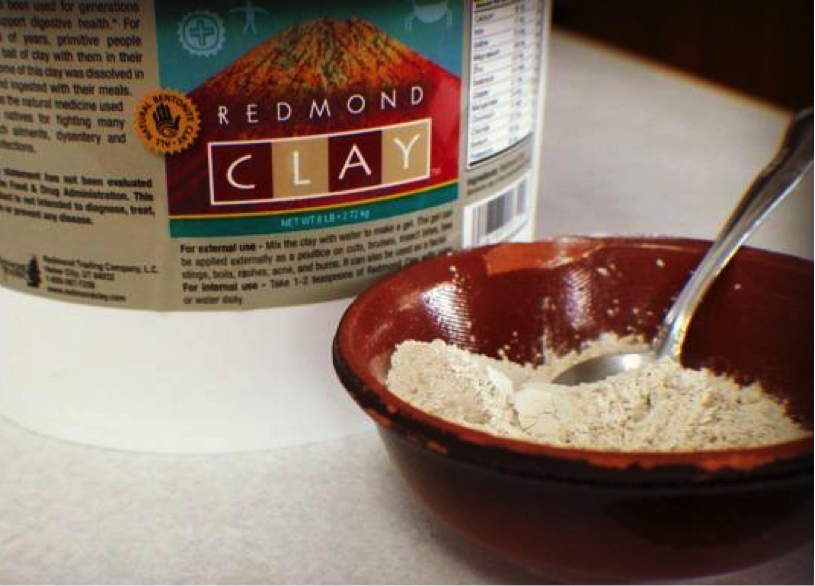 3. Redmond Mineral Clay –
3. Redmond Mineral Clay –
This clay is one of my favorite products for animals and humans! We add it to our animal’s feed if it appears they are feeling poorly or their stools are loose. We also use it to pack wounds as it remove toxins. For humans, its my go-to remedy for nausea and gas/bloating issues. I buy it by the tub and make my own gelatin capsules although you can mix it with a bit of water and drink it straight down…
4. Garlic granules –
To keep worms and parasites at bay, garlic is an awesome natural remedy. Before we found a local neighbor who makes natural pig feed for us, we use to add a pound of garlic granules to every ton of feed we had made. Our butcher said he could definitely tell our pigs had far less worm issues than most of the ones he saw. We also add garlic granules to our dairy cow’s feed if we sense mastitis coming on although only a little bit ( a couple of tablespoons at most or you will have milk that tastes like garlic…)
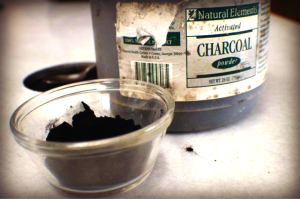 5. Activated charcoal –
5. Activated charcoal –
We use charcoal for many of the reasons we use Redmond clay. Sometimes we use both if an animal is not doing well. We also use charcoal for yellow jacket and bee stings – if you make a poultice quickly and apply it to the sting the pain will usually go away in just a few minutes. Charcoal and Redmond Mineral Clay can also be added to an animal’s drinking water as a preventative for animals prone to digestive issues.
6. Vegetable oil –
I always keep some kind of vegetable oil on hand for bloat, usually sunflower or grapeseed. If an animal goes down with bloat our first line of defense is to mix some peppermint essential oil (a few drops into a cereal bowl of vegetable oil- please only use essential oils that are classified as a supplement to be used internally) , put this into a syringe and shoot it down the animals throat. Gently massaging the animal’s belly at the same time will usually help to relieve the gas.
7. Raw Apple Cider Vinegar and Molasses –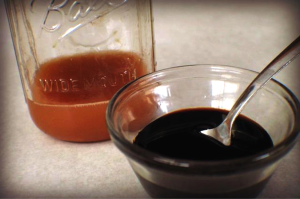
We use a combination of the two of these (mixed with warm water) if we have an animal that appears weakened and also for an animal that has just given birth. Both help replace lost minerals and give energy. We also use apple cider vinegar as a general tonic for our animals and to ferment our dairy cows grain ration.
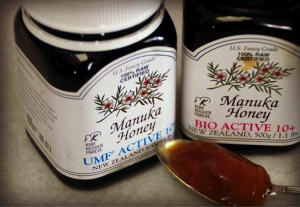 8. Raw and Manuka Honey
8. Raw and Manuka Honey
Honey is great to help give animals energy if they are not doing well (we mix with some warm water and feed every couple of hours). We use raw honey which we buy by the 5 gallon bucket from Azure Standard. Manuka honey is a phenomenal product but it is expensive so I keep it for very specific reasons. Its excellent for wound care and for humans its great for sore throats. To learn more about Manuka honey and its incredible properties visit this site.
8. Baking Soda –
Baking soda is great for PH imbalances and bloat issues. When the animals return to pasture after winter, we place feeders full of Baking Soda out in the fields so they can use it as needed. Just a tip – don’t buy baking soda for animals through a grocery store. Most feed stores carry it in 50 lb bags for significantly cheaper. If there are no feed stores in your area, Amazon also sells larger bags with free shipping.
Farm Apothecary is the idea of treating farm animal ailments with natural products at home first!
Of course if you want to have healthy animals, treating them well is the first key to success. Here are 4 ways we try to prevent illness before it can even start:
1. Feed them wholesome, natural feeds:
A good diet goes along way towards keeping an animal healthy. Paying more for a locally sourced, all natural feed is worth it in the long run if you don’t have high vet bills and your animals stay healthy. Fresh food is important during the winter months too so if you can grow vegetables to store for them or find them in bulk, do so. We bought 3,000 lbs of apples from a nearby orchard this year so our animals can eat them through the winter.
2. Give high quality supplements:
An animal who has the vitamins and minerals it needs will, of course, be healthier. There are many good options out there but on our farm we use a combination of Redmond Mineral Salt with extra Selenium and Redmond Mineral Conditioner. We feed our minerals free choice but a daily ration can also be given mixed with feed.
3. Choose hardy breeds:
When picking animals for our farm we specifically looked for breeds that could forage for their own food and do well in less than ideal conditions. A hardy animal is a huge blessing when the weather is cold and rainy for days at a time, when you cannot be there for birthing or the hay you find locally isn’t all that great. For this reason we picked mostly heritage breeds. The downside is we do not have super-sized lamb cuts and our pigs take a bit longer to grow but its a tradeoff we are willing to make to have healthy animals. We have also found that the slower growing heritage breeds of animals taste way better!!
4. Keep them outside and moving around:
Sunshine and fresh air is one of the best preventatives of all, even in the winter. We keep our animals on large sections of ground outside with access to shelter all year round. We cannot move them during the winter months because the ground is too hard (someday we will get our ducks in a row and have a few pens set up so we can rotate them in the winter too…) so we make sure this area is extra large. In the summer months we move the cows and sheep everyday and the pigs usually several times a season. Animals in the open air will grow a bit slower because they get so much exercise but the trade off is healthy animals and tasty, lean meat.
So, this is what we do on our farm and homestead to care for the animals we love. Of course, I am not a doctor so please investigate for yourselves when it comes to your animals and their care.
Also, if you know of other ways to treat animals naturally I would love to hear them- I am always open to new ideas. You can connect with me on Facebook, Pinterest, Twitter, and Tumblr. Thanks to Homestead Dreamer for letting me guest post. 🙂




